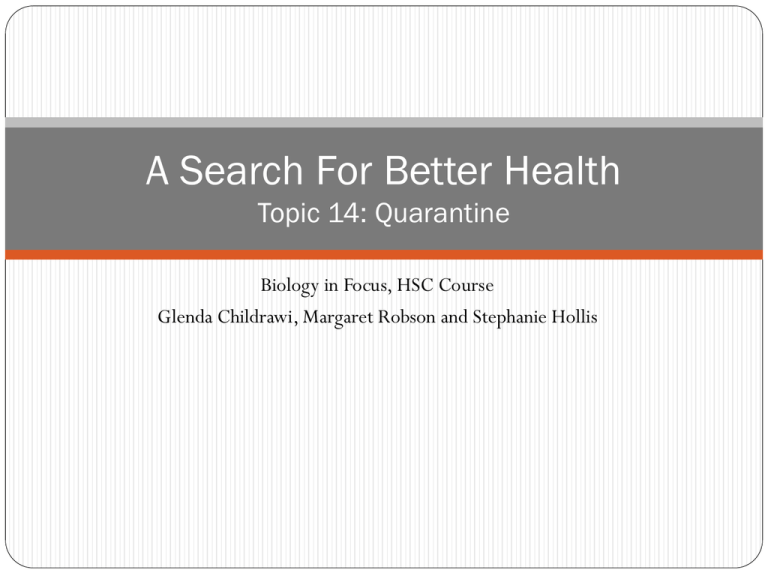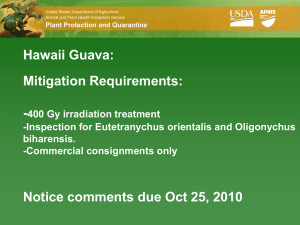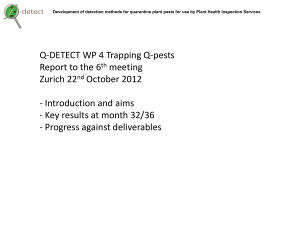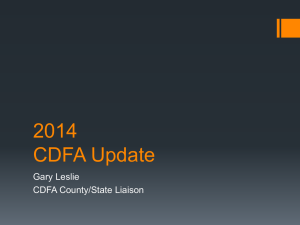14.1.1 Quarantine
advertisement

A Search For Better Health Topic 14: Quarantine Biology in Focus, HSC Course Glenda Childrawi, Margaret Robson and Stephanie Hollis DOT Point(s) discuss the role of quarantine in preventing the spread of disease and plants and animals into Australia or across regions of Australia Introduction The increased understanding of the cause and treatment of disease has led to a dramatic rise in the average life expectancy over the last 100 years. With the major advancements in the field of medical research, the emphasis now is on improving the prevention and control of diseases rather on treating them once they have occurred. www.gemplers.com Introduction Prevention of a disease involves stopping the occurrence of the disease in individuals. Control of a disease involves regulating the incidence of the disease in the population and stopping any further spread of the disease. Some of the strategies that can be used to prevent and control disease are vaccination, quarantine, public health programs, the use of pesticides and genetic engineering. www.umm.edu Quarantine Quarantine, or isolation, of diseased organisms is a strategy that has been used for a very long time to control the spread of a disease. The word ‘quarantine’ comes from the Italian quaranti giorni, meaning ‘40 days’. www.abc.net.au Quarantine In the 14th century, when bubonic plaque was sweeping through Europe, any ships that were visiting Venice had to anchor away from the city for a period of 40 days before they could unload their passengers or cargo. It was thought that this was sufficient time for any diseases that were present on the ship to be identified or to run their course. www2.umoncton.ca Quarantine Australia is one of the very few countries in the world that remain free of the world’s most serious pests and diseases. Originally, this was due mainly to our geographical isolation. This isolation decreased as international travel and trade increased and led to the need for a much more sophisticated and thorough system to prevent the entry of pests and diseases into our country. australia.gov.au Quarantine The Australian Quarantine and Inspection Service (AQIS) is responsible for maintaining our reputation as a relatively disease-free country. www.perthairport.com.au - Quarantine The role of quarantine is to minimise the risk of exotic pests and diseases entering Australia in order to protect our native flora and fauna, our agricultural industries, our environment and our health. www.heifetzphotography.com.au Quarantine Our thousands of kilometres of coastline, and our proximity to neighbouring countries such as South-East Asia and the Pacific nations, which have pests and diseases that are not present in Australia, make us particularly vulnerable to invasions. dennis-geography.blogspot.com Quarantine These pests and diseases could be brought into Australia by people, animals and plants. They could also be brought in by animal and plant products, or in soil that is on shoes or machinery. www.freepik.com Quarantine AQIS has many strategies in place to prevent the entry of unwanted pests and diseases into Australia. These include: Border control, which involves the checking of passengers and cargo at the entry points into Australia. ecsaus.com.au Quarantine A range of techniques are used by quarantine officers, including Xray machines, detector dogs, surveillance and inspection at international airports, seaports, mail exchanges and container depots. Containers are checked, holds of ships are inspected, mail is often opened and inspected, and the entry of any suspect item is stopped. The cargo, ballast water and hulls of ships can also be checked to ensure that no foreign pest is present. www.couriermail.com.au Quarantine People entering Australia may not bring in such things as plant seeds, fresh foods, eggs and egg products, dairy products, meat and all pork products, or soil (including that on muddy boots or golf clubs). All of these items and more could contain many dangerous plant and animal pests and diseases. www.3aw.com.au Quarantine In an effort to deter the entry of prohibited material into Australia, and thus prevent the entry of plant and animal diseases into Australia, large fines and gaol terms are imposed on individuals who are guilty of bringing banned items into Australia. www.customs.gov.au Quarantine Animal quarantine, which involves all animals coming into Australia spending time at quarantine stations to make sure that they are free of disease before they are released. If you had pets that you wanted to bring into Australia, you would have to leave them in quarantine for a number of weeks. These animals would be examined on a regular basis for any signs of disease. www.guardian.co.uk Quarantine Plant quarantine, which involves examining all plants, parts of plants or plant products (fruits, seeds, cuttings, bulbs and wood). Many of these items will be refused entry into Australia. In some cases these items will be allowed into Australia only if they are treated by quarantine officers to ensure any likely pests or pathogens are destroyed. www.smh.com.au Quarantine Human quarantine. The captains of aircrafts and ships are required to notify AQIS if any passengers or crew are displaying any symptoms of prohibited diseases such as rabies, yellow fever, malaria, SARS (severe acute respiratory syndrome) and avian influenza (bird flu). Passengers showing any symptoms as designated by AQIS must also be reported. www.theaustralian.com.au Quarantine The Northern Australia Quarantine Strategy (NAQS). The northern part of Australia is only a short distance from countries that have many exotic pests and diseases not present in Australia. An early warning system has been developed to protect this susceptible area of Australia. www.daff.gov.au Quarantine NAQS staff also liaise with staff from the quarantine services of neighbouring countries to determine, among other things, if there have been any outbreaks of new diseases in their countries. Surveillance of existing diseases is also carried out in these countries. www.daff.gov.au Quarantine The role of quarantine strategies within Australia is to prevent the spread of existing pests and diseases of plants and animals, especially to areas that are free of these pests and diseases. Within Australia there are also restrictions on the movement of fruit, vegetables and livestock from one area to another. www.progressivedinnerparty.net Quarantine Pests and diseases can spread from one part of Australia to another by the movement of plants, seeds, fruit, vegetables, soil, plant products and livestock. Each state and territory has in place legislation that governs the movement of these items from one area to another. www.travelvictoria.com.au Quarantine This is to protect the agricultural industries from invasion by pests and diseases and enable them to continue supplying both local and export markets. If a pest or disease were to be introduced into an agricultural production area, it could lead to expensive control measures and the loss of markets worth millions of dollars. www.abc.net.au Quarantine In 1994, growers, industry and governments from three states established a fruit fly exclusion zone (FFEZ) in order to protect the fruitgrowing regions in South Australia, northern Victoria and southern New South Wales. Quarantine When infested with the Queensland fruit fly, the fruit produced will appear normal on the outside but be very soft and brown on the inside. Fruit-growing areas in the FFEZ are free of infestation by the Queensland fruit fly. www.dpi.vic.gov.au Quarantine Growers from within the zone can market their product as being free from fruit fly; this allows them to access many lucrative markets that growers outside the zone cannot. www.ntnews.com.au Quarantine Fruit flies are incapable of flying very far, so the main way in which they are introduced into an area is in infected fruit carried by visitors to the area. blog.bugsforbugs.com.au Quarantine There are warning signs on all roads approaching the boundaries of the FFEZ asking that any fruit be placed in the quarantine bins supplied. There are also a number of permanent checkpoints in place to prevent the movement of fruit into these areas. Heavy fines apply to anyone who takes fruit into the FFEZ. web2.newtown-h.schools.nsw.edu.au Quarantine The effectiveness of these strategies to prevent the spread of fruit fly into the FFEZ has been fairly high as this area has remained relatively free from the pest for many years. There are a number of other restrictions on the movement of plants and animals in place in Australia. www.cmca.net.au Homework -Students to complete Effectiveness of Quarantine Activity.








